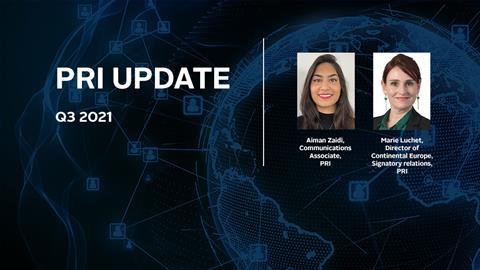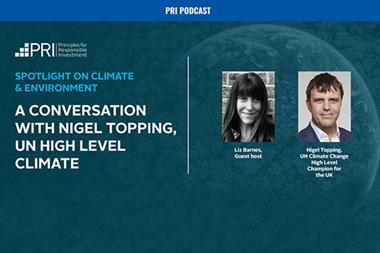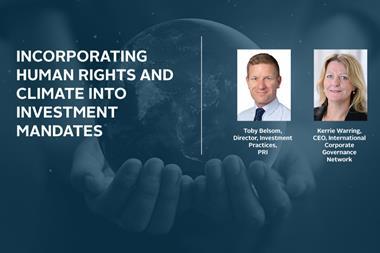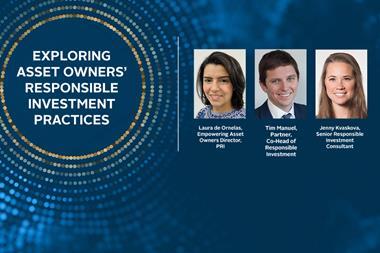The PRI quarterly update ft. Marie Luchet
With Aiman Zaidi, Communications Associate, PRI and Marie Luchet, Director of Continental Europe, Signatory Relations, PRI
Note: The Principles for Responsible Investment podcast is designed to be heard. If you are unable to do this, this transcript offers an insight into the episode.
Transcripts are generated using a combination of speech recognition software and human transcribers, and may contain the occasional error. Please check the corresponding audio before quoting in print.
Subscribe to the channel via Apple podcasts, Spotify, or wherever you listen to your podcasts.
Aiman Zaidi
Hello and welcome to the PRI Podcast. My name is Aiman Zaidi and I’m the Communications Associate at the PRI. In this episode, we’ll be taking about the key activities of the PRI from the past quarter and what to expect from the PRI for the remainder of the year about climate mitigation, upcoming events, our human rights work and much more. The threat of climate change continues to impact us, and the world is in a race to reach net zero emissions. With COP26 in Glasgow next week, the PRI is prioritising to raise government and investor ambition towards net zero emissions in line with the Paris Agreement.
Today, my guest is Marie Luchet, the Director of Continental Europe, Signatory relations at the PRI. Welcome Marie.
The PRI focuses on convening government leaders and investors on actionable climate targets in line with the Paris Agreement. What can you tell us about PRI’s recent work on climate action, especially with COP26 taking place next week?
Marie Luchet
Thank you Aiman!
The role of the Glasgow conference is pivotal as, at present, the country commitments made alongside the Paris Agreement are insufficient to meet the 1.5 degree warming target. The aim of COP26 is to raise climate ambition, to turn goodwill into action and to achieve emissions reductions across all segments of the financial sector and the real economy.
How is PRI supporting? A few examples of our actions - Firstly, PRI is collaborating with others in the finance sector through the Race to Zero campaign and the Glasgow Financial Alliance for Net Zero to send a strong message of its commitment to net zero by 2050.
Secondly, PRI is supporting investors as they increase action on net zero ambitions. The membership of the Net Zero Asset Owner Alliance has expanded to 49 asset owners. The alliance has just released its progress report highlighting the members’ new 2025 targets. The PRI is also supporting two newly launched finance sector initiatives promoting net-zero greenhouse gas emissions, the Net Zero Investment Consultants Initiative and the Net Zero Financial Service Providers Alliance. These launches are key to ensuring the entire investment value chain is covered. Also, Climate Action 100+ has recently released decarbonisation expectations for the steel, the food and beverage and the energy sectors
Aiman Zaidi
At the start of this quarter, the PRI released the report A Legal Framework for Impact. Could you briefly run through the key takeaways of the report?
Marie Luchet: Yes, our new report, A legal framework for impact, has been commissioned by the PRI, UNEP FI and The Generation Foundation, and authored by global law firm Freshfields. It provides legal analysis on how far investing for sustainability impact is legally required or permitted across 11 jurisdictions and it makes recommendations for change
Aiman Zaidi
What can we look forward to in terms of next steps?
Marie Luchet: In terms of next steps, the PRI will translate the findings of the legal analysis into specific engagement with policy makers and signatories in five key jurisdictions – Australia, Canada, Japan, the UK and the European Union.
Aiman Zaidi
As we already know, the PRI has been involved in supporting investors’ efforts to address social issues such as human rights. What are some of PRI’s recent projects that address human rights issues?
Marie Luchet
The PRI works very closely with its signatories to maximise investor contribution towards respecting human rights. This quarter, thanks to our signatories’ involvement, we’ve published very interesting case studies which focus on applying human rights in private market investments. The PRI is also excited to soon launch a new collaborative stewardship initiative on social issues and human rights. So watch out for this!
Aiman Zaidi
PRI has received quite a few resources and tools recently. Can you tell me a little bit more about them?
Marie Luchet
Yes, of course, I will give you a few examples. I will start with our new report called ‘Embedding ESG factors into investment mandates’ as part of our empowering asset owner programme. In the context of investors taking increasing action on net zero ambitions, asset owners’ demand for meaningful and reliable ESG information has been growing. This new report outlines common approaches and challenges to incorporating ESG considerations and sustainability outcomes in new or existing investment mandates.
I would also like to draw your attention to two new resources on topical environmental issues. This summer, we published a report summarising the outcomes of the collaborative engagement on responsible cobalt sourcing. 46 institutional investors have engaged with 16 companies in the electronics and automotive sector to improve their performance in three focus areas: human rights risk assessment and due diligence efforts; impact monitoring and corrective action; and collaboration on systemic issues. Secondly, I would also like to flag that PRI’s Plastics investor working group has worked with the Ellen MacArthur Foundation to launch practice engagement guidance on plastic waste and pollution.
Aiman Zaidi
Now if you’re a PRI signatory, you may already be aware that the PRI received feedback on the reporting pilot and we are addressing some of the data issues. Marie, what’s the latest update with the reporting and assessment?
Marie Luchet
Yes, reporting is a key topic for our signatories and 1700 of them have provided feedback on the 2021 reporting pilot. In response to the feedback and the issues identified, we’ve revaluated how we can best fit this process to signatories’ needs in the future.
The PRI has decided to take a staged approach to release the 2021 outputs and delaying the next reporting cycle until 2023. This delay in the reporting cycle provides us with time to incorporate signatory feedback and to significantly improve user experience by 2023.
Firstly, the private transparency reports will be released soon in the new data portal to check for any gaps and errors – it is important to note that, when necessary, we will make the changes on behalf of our signatories.
Then, the public transparency reports and assessments will be released by June 2022. Or, earlier if possible, subject to volume of changes flagged by signatories.
Aiman Zaidi
Before we move onto the next quarter, I wanted to ask you about the recent PRI Digital Conference. Which sessions/themes did you enjoy the most?
Marie Luchet
I attended many interesting sessions but there is one that I particularly enjoyed, and this is ‘Raising the bar on Diversity, Equity and Inclusion: the investor perspective’. This panel gathered inspiring investors who highlighted the importance of addressing DEI, both internally and through their investment activities.
The discussion emphasised that, to see real progress towards a more equitable society, we need to move our focus and efforts from just diversity to inclusion. Thought leader Verna Myers summed it up by saying that diversity is being asked to the party. Inclusion is being asked to dance. The panellists rightly pointed out that one of the key obstacles for better inclusion is existing social biases. And that there are many advantages and barriers that exist, and that, as a result, not everyone starts from the same place.
At PRI, we look to increase investors’ understanding of the diversity and inclusion issues by studying key diversity characteristics beyond gender and at seniority levels other than board level. In addition, because the financial sector has a lot of work to do to become an inclusive industry, we also aim at working with investors on their own diversity practices and efforts at all seniority levels, in all teams, in both public and private markets and including through the selection of external managers by asset owners.
Finally, as an organisation, we also need to walk the talk! It’s fair to say that at the PRI - whilst we have made good progress around gender diversity, we need to go much further and also focus on all other aspects of diversity, including race socio-economic backgrounds. PRI is committed to being more diverse and inclusive, to measuring its progress and to holding itself to account.
So, if you’ve missed this stimulating and thought-provoking session, I really encourage you to watch the recording!
Aiman Zaidi
So in summary, what should we expect from the PRI in the next quarter? And what is the one thing you’re looking forward to we as reach the end of 2021?
Marie Luchet
America’s climate envoy John Kerry says the COP26 climate change summit in Glasgow is the “last best hope for the world to get its act together” so let’s hope that COP 26 will result in tangible commitments from the public and private sectors to strengthen our fight against climate change. From PRI side specifically, we’ve started some work on Venture capital as it’s an asset class that has lacked attention but where establishing good practice as early as possible is crucial. We will be releasing a new version of our LP private equity due diligence questionnaire in a few weeks’ time. This new DDQ aims to specifically draw out information about how GPs integrate climate considerations into their investment processes and we’re happy to announce that The Institutional Limited Partners Association (ILPA) will be adopting it into their broader PE DDQ which will be launched at the same time.
Finally, I would like to end this podcast by inviting all signatories to save the date for our flagship event PRI in Person 2022 which will take place from the 20th to the 22nd of September 2022 in Barcelona, Spain.
Aiman Zaidi
Thank you for your insights, Marie, a really useful round up. Don’t forget you can stay informed with all our work via our social media channels. We’re on Twitter, LinkedIn, Facebook, YouTube and WeChat. We have also launched our Instagram page, please follow us on pri_culture.
Don’t forget you can access all the resources we discussed in the episode description.
Stay tuned for our next podcast which will be about climate and UK asset owners.
If you liked this episode, please do rate and subscribe. If you’d like more information about responsible investment, go to unpri.org.
Interested in the resources discussed in this episode?
Climate Action 100+ decarbonisation expectations for the steel
Climate Action 100+ decarbonisation expectations for food and beverage
Net Zero Investment Consultants Initiative
Net Zero Financial Service Providers Alliance
Investment mandates: Embedding ESG factors, improving sustainability outcomes
Downloads
Transcript: The PRI quarterly update
PDF, Size 0.2 mb



















